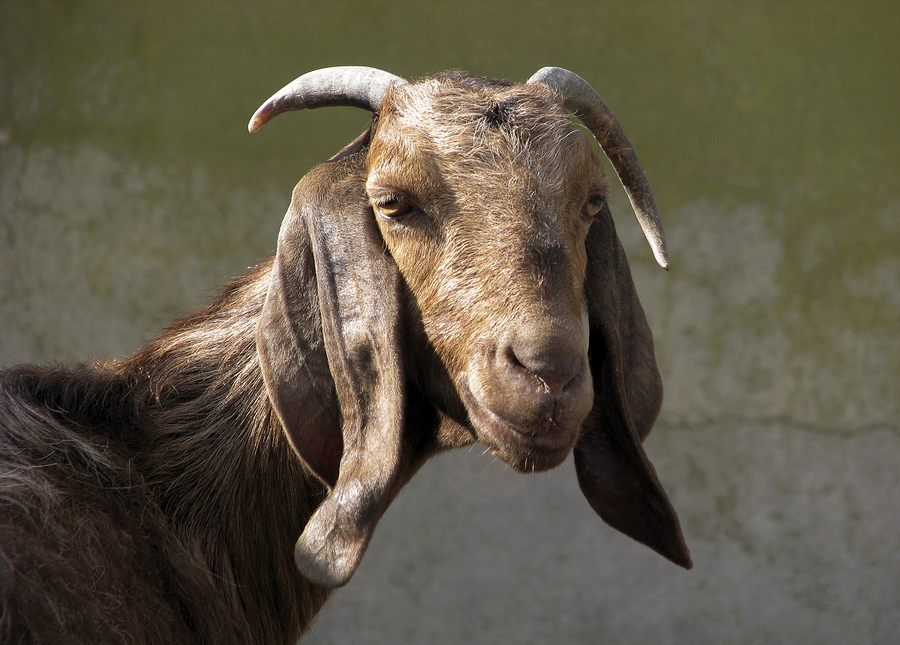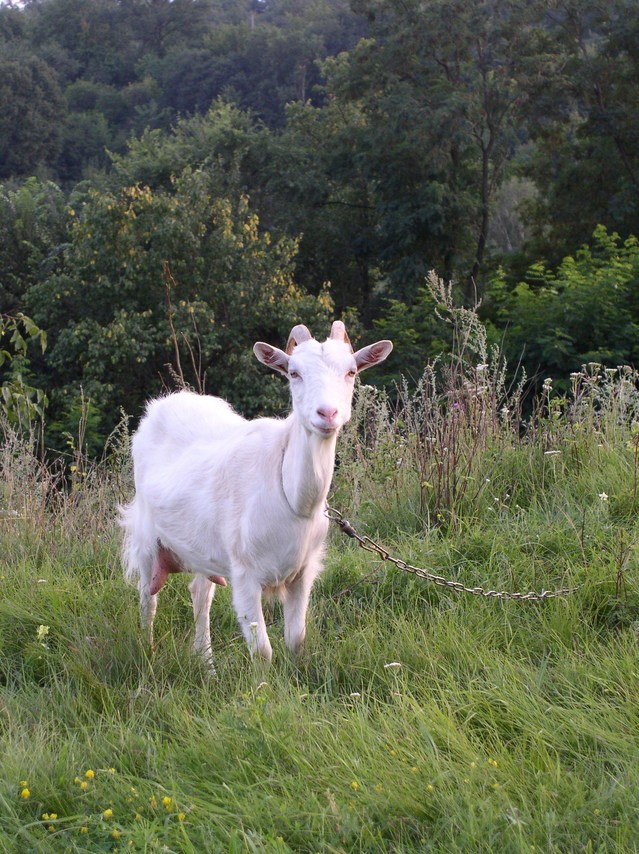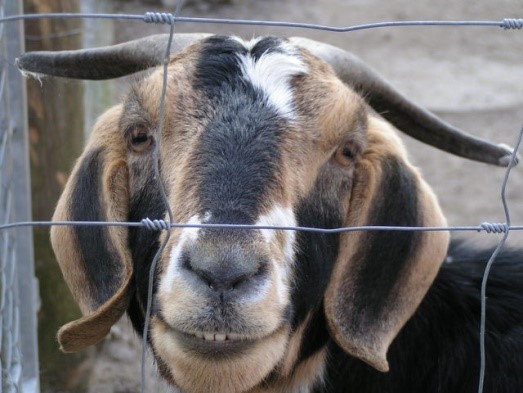Why Start Raising Goats?
If you are considering goats for your homestead, urban or suburban property the first thing to check out is any local laws concerning them. One of the reasons why we decided to buy some land in the country was because our Home Owners Association does not allow any livestock in the community. Our city allows four chickens per single family lot, but doesn’t allow goats or other livestock in residentially-zoned areas.
If your zoning and other regulations don’t prevent you from having goats, the next thing to consider is why you want to keep goats. Do you like goat’s milk or products you can make from it? Do you want to eat goat meat? Do you want to keep them as pets or for clearing brush on your property or some other use? Goats can be bred for fiber to make clothing and have even been trained as pack animals for campers. The reason for keeping them should be narrowed down so that you can consider which breed would work best for you and your property. Our four acre property has plants growing all over the place that need to be cleared and we want to use both goat milk and meat, so that gives us lots of options in terms of breeds that could do those jobs.
Raising Goats in Challenging Places
One other initial consideration is the climate. Some goat breeds do better in warmer climates than others. There is no reason to get a goat that will be miserable where you live because it is too hot. For Florida, the La Mancha (a goat breed with small or no ears) and the Nubian (a long-eared goat breed) are probably the best choices because they both can be used for meat and milk and can tolerate the heat. Additionally, both breeds produce milk that is rich in butterfat although the Nubian may produce smaller quantities than other breeds. For a couple of newbie goat owners who like ice cream, this sounds pretty good!
Next, consider where you will keep your goats. They are herd animals so you should have at least two to keep them happy. If you are keeping smaller breeds or miniatures, you can get away with less space, but remember that goats need room to run and play and especially something to climb on. According to one guide published by the University of New Hampshire Cooperative Extension, “one dairy goat needs a minimum of 20 – 25 square feet of enclosed housing and another 50 square feet of exercise area.” With two goats you would need to provide at least 100 square feet of space (about the size of a small bedroom) in a yard with access to fresh water and shelter from rain, excessive sun, or cold. This would be the minimum in order to provide a healthy environment for your animals.
Read more: Homestead Upcycling – How to Profit from Waste Streams
Finding the Right Goats for You
Once you have determined that you won’t be breaking any laws, have the space, and know what breed or breeds would work you can start looking around for goats in your vicinity. There are places that have goats you can adopt, goats for sale from individuals, breeders, and auctions. Before you get your animals, it makes sense to get more familiar with them and spend some time around them. We located two families within a mile of our property that already had goats and got in touch with them to increase our understanding. Not only did we meet their goats, but we were able to find out the kinds of predators that we could expect in our area. Very valuable information!
Obviously, there is a lot to know about goats: feeding requirements, housing, medical care and more that I haven’t even touched on. The best plan is to know before you go. Beyond basic skills for keeping goats we intend to get some milking practice, learn how to butcher them humanely, and find out the plants in our area that are poisonous to goats before we even consider a purchase. Our neighbors have already agreed to check out the fencing and shelter we want to use before we bring our goats home. Maybe they will even lend us a few to occasionally browse through the weeds for an afternoon!
Karen the Newbie Homesteader is a novice gardener, homesteader, and permaculturist. She and her husband recently purchased four acres in central Florida to create their homestead and grow their own food. She will be sharing their adventures: successes, failures, and everything in between – here at The Grow Network.











COMMENTS(8)
Nice article to get people thinking.
Goat people are absolutely wonderful! Most love to show you their setup and talk about goats and their care. Almost every part of the country now has either goat specific or homesteading and livestock Facebook groups. There are a few national goat vet advice groups, too.
In my case, I was able to visit a number of small farmers and found a lovely family running a herd of Nubians. They entertained my questions and visits for over a year before purchasing two weaned doelings. This family helped me design a barn and fencing. Two years later they have continued to offer immediate answers to minor issues.
Today, those doelings have given me six bucklings and untold gallons of sweet milk. And this only the first kidding year! It continues to be a great adventure. -AJ
Are goats able to defend themselves from predators? I’ve heard that Nubians tend to butt very forcefully. Where I live there are so many predators that keeping livestock requires a pretty extreme amount of protection, so self defense may be advantageous in addition to defense we can put in place.
Karen,
I am in Lake Wales, Florida, and I have lived here all 72 years of my life. So, I do have some experience to call upon. I started raising chickens, rabbits, and a garden when I was still in elementary school. On 2.5 acres in central Florida, you can truly homestead and meet all of your needs, and I would be happy to help you. I have an associate who has helped people such as yourself, who wish to live off of the land for all of his 73 years. He was sent to South America to help the subsistence farmers who relied on his counsel for their families. This is the kind of person who can really help someone such as yourself, if you are really wanted to provide for all of your needs. I would also suggest that even though you have a lot of room, you should still plant extensively, and in a way that requires as little care as possible. By doing this, you can sell or trade your extra production for revenue or for barter. If you have any interest in any of my suggestions, email me at FazziniHouse AT aol DOT com.
All the best,
John Fazzini
The short answer is “No!”. Sheep and goats need shephards, good fences both net and electric, and guardian dogs for protection. My experience has been that even a determined goat with a high ground advantage will get ripped to shreds by a pack of small dogs. Pet dogs which have gotten together in a temporary pack are very damaging because they aren’t after food but sport. Wild predators are more rational and easier to protect your animals from.
On a cheerier note, goats, especially Nubians, believe fences are keeping them from all the fun things in life and spend a good deal of time planning and executing escapes. Sheep seem to think fences are there because their people care for them and want to keep them safely inside so they stay. Many sheep also make beautiful wool. I’ve had both and enjoy not being entertain daily by the crazy escapes of the goats. In fact, when I’m home my sheep often graze near the house without a fence. The Nubians would have been across the horizon as soon as I let them out!
If trained from a young age, can goats be trained to a teather limiting the amount of fencing required, especially on large unfenced acreage?
I used to have a very fine herd of goats in the Missouri Ozarks on 120 acres. I would ring a cow bell every evening and feed them a bit of grain. All my animals-goats, chickens, horses, dogs, cat came whenever the bell was rung. (Pretty handy on getting them in when a storm was coming in as well.) I really had to fence them out of my garden and other areas. BTW-goats will eat the clothes hanging on a line and they can chew thru the wiring harness underneath a farm vehicle. Fence those in as well. Back to the issue, as long as they have enough food and water- they won’t want to get to far away.
Having raised goats for 14 years, the info is to basic. The info needs to go into the meat goats verses dairy goats and be more specific. Some cities will allow goats as pets. The Nigerian Dwarf is a great dairy and meat goat. I have been raising, milking and showing them for over a decade. The hearty little Nigerian has out performed the big goats of both meat and dairy. Both cattle and goats don’t run away as long as they have enough to eat. I am in the south and do feed Purina products. My Nigerian Dwarf herd is a milk production herd and they milk like crazy when fed well. If a time came where the feed was not available, they could survive and thrive, but not be top ten milkers. That would be acceptable in a situation like that. Kudzu is a fantastic feed for goats for those who are over run by it.